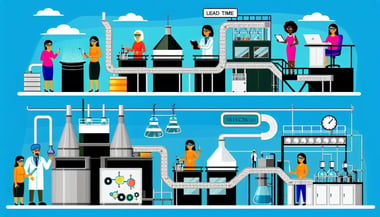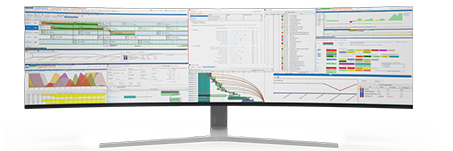Topics: PlanetTogether Software, Data Consistency, Integrating PlanetTogether, Real-Time Data Exchange, Automated Workflows and Alerts, Improved Visibility, Dynamic Scenario Planning, Chemical Manufacturing
In today's competitive manufacturing landscape, plant managers in chemical manufacturing facilities are constantly challenged to optimize their production processes to meet ever-increasing demands for efficiency, quality, and cost-effectiveness. One critical aspect of achieving these goals is the reduction of lead times in production scheduling.
This blog explores how predictive analytics, coupled with the integration of advanced planning and enterprise resource planning (ERP) systems like SAP, Oracle, Microsoft, Kinaxis, Aveva, and others, can revolutionize lead time reduction in chemical manufacturing facilities.

Lead time refers to the time it takes for an order to be processed from the moment it's placed until the finished product is ready for delivery. In chemical manufacturing, where raw materials need to be mixed, processed, and tested to meet stringent quality standards, lead times can often be extended, impacting the overall efficiency of the production process.
Predictive analytics leverages historical data, statistical algorithms, and machine learning techniques to forecast future events or trends accurately. In the context of lead time reduction, predictive analytics can play a pivotal role in several ways:
Demand Forecasting: Predictive analytics models can analyze historical order data and market trends to provide accurate demand forecasts, allowing plant managers to plan production schedules more effectively.
Inventory Management: By predicting demand and lead times, plant managers can optimize inventory levels, reducing excess inventory costs while ensuring timely material availability.
Production Process Optimization: Predictive analytics can identify potential bottlenecks or process inefficiencies in real-time, enabling proactive adjustments to minimize lead times.
Quality Control: Advanced analytics can help in identifying patterns related to product quality, allowing for early intervention and reducing rework, which can significantly impact lead times.
![]()

To fully harness the power of predictive analytics for lead time reduction, chemical manufacturing facilities should consider integrating advanced planning tools like PlanetTogether with their existing ERP, Supply Chain Management (SCM), and Manufacturing Execution Systems (MES). Here's how this integration can benefit plant managers:
Real-Time Data Exchange: Integration enables real-time data exchange between production scheduling systems and ERP/SCM/MES systems, ensuring that decisions are based on the most up-to-date information.
Improved Visibility: Plant managers gain comprehensive visibility into the entire supply chain, from raw material procurement to final product delivery, facilitating better decision-making.
Automated Workflows: Integration allows for the automation of routine tasks, such as order processing and inventory replenishment, reducing manual errors and saving time.
Data Consistency: Data consistency across systems eliminates discrepancies and ensures that everyone in the organization is working with the same accurate information.
Scenario Planning: Advanced planning tools integrated with ERP systems allow plant managers to perform scenario planning, enabling them to evaluate the impact of different production schedules on lead times and costs.
In the highly competitive landscape of chemical manufacturing, reducing lead times is critical for staying competitive and meeting customer expectations. Predictive analytics, when integrated with PlanetTogether and ERP systems like SAP, Oracle, Microsoft, Kinaxis, Aveva, can provide plant managers with the tools they need to make informed decisions, optimize production processes, and ultimately achieve significant lead time reductions.
By leveraging historical data, machine learning algorithms, and real-time data synchronization, chemical manufacturing facilities can not only reduce lead times but also enhance product quality, streamline resource allocation, and improve overall operational efficiency.
The future of production scheduling in the chemical manufacturing industry lies in the hands of those willing to embrace predictive analytics and integration as powerful tools for success.
Topics: PlanetTogether Software, Data Consistency, Integrating PlanetTogether, Real-Time Data Exchange, Automated Workflows and Alerts, Improved Visibility, Dynamic Scenario Planning, Chemical Manufacturing
0 Comments
No video selected
Select a video type in the sidebar.







LEAVE A COMMENT